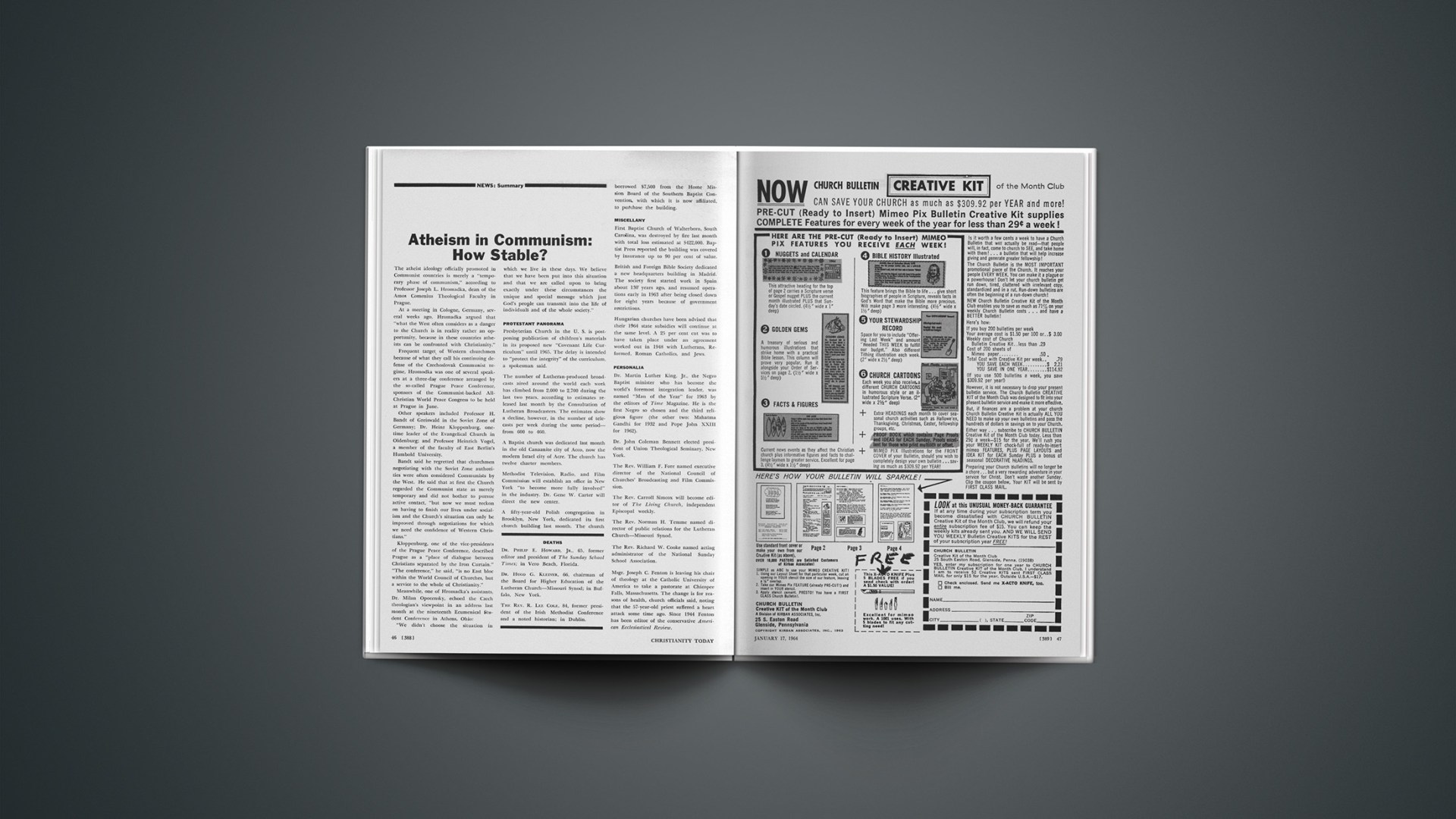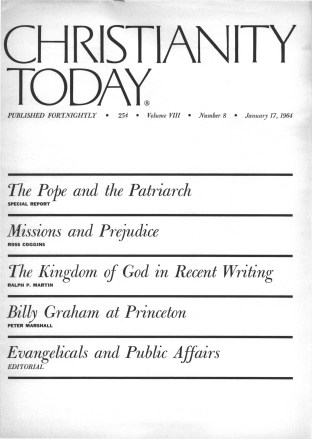The atheist ideology officially promoted in Communist countries is merely a “temporary phase of communism,” according to Professor Joseph L. Hromadka, dean of the Amos Comenius Theological Faculty in Prague.
At a meeting in Cologne, Germany, several weeks ago, Hromadka argued that “what the West often considers as a danger to the Church is in reality rather an opportunity, because in these countries atheists can be confronted with Christianity.”
Frequent target of Western churchmen because of what they call his continuing defense of the Czechoslovak Communist regime, Hromodka was one of several speakers at a three-day conference arranged by the so-called Prague Peace Conference, sponsors of the Communist-backed All-Christian World Peace Congress to be held at Prague in June.
Other speakers included Professor H. Bandt of Greiswald in the Soviet Zone of Germany; Dr. Heinz Kloppenburg, onetime leader of the Evangelical Church in Oldenburg; and Professor Heinrich Vogel, a member of the faculty of East Berlin’s Humbold University.
Bandt said he regretted that churchmen negotiating with the Soviet Zone authorities were often considered Communists by the West. He said that at first the Church regarded the Communist state as merely temporary and did not bother to pursue active contact, “but now we must reckon on having to finish our lives under socialism and the Church’s situation can only be improved through negotiations for which we need the confidence of Western Christians.”
Kloppenburg, one of the vice-presidents of the Prague Peace Conference, described Prague as a “place of dialogue between Christians separated by the Iron Curtain.” “The conference,” he said, “is no East bloc within the World Council of Churches, but a service to the whole of Christianity.”
Meanwhile, one of Hromadka’s assistants, Dr. Milan Opocensky, echoed the Czech theologian’s viewpoint in an address last month at the nineteenth Ecumenical Student Conference in Athens, Ohio:
“We didn’t choose the situation in which we live in these days. We believe that we have been put into this situation and that we are called upon to bring exactly under these circumstances the unique and special message which just God’s people can transmit into the life of individuals and of the whole society.”
Protestant Panorama
Presbyterian Church in the U. S. is postponing publication of children’s materials in its proposed new “Covenant Life Curriculum” until 1965. The delay is intended to “protect the integrity” of the curriculum, a spokesman said.
The number of Lutheran-produced broadcasts aired around the world each week has climbed from 2,000 to 2,700 during the last two years, according to estimates released last month by the Consultation of Lutheran Broadcasters. The estimates show a decline, however, in the number of telecasts per week during the same period—from 600 to 460.
A Baptist church was dedicated last month in the old Canaanite city of Acco, now the modern Israel city of Acre. The church has twelve charter members.
Methodist Television, Radio, and Film Commission will establish an office in New York “to become more fully involved” in the industry. Dr. Gene W. Carter will direct the new center.
A fifty-year-old Polish congregation in Brooklyn, New York, dedicated its first church building last month. The church borrowed $7,500 from the Home Mission Board of the Southern Baptist Convention, with which it is now affiliated, to purchase the building.
Deaths
DR. PHILIP E. HOWARD, JR., 65, former editor and president of The Sunday School Times; in Vero Beach, Florida.
DR. HUGO G. KLEINER, 66, chairman of the Board for Higher Education of the Lutheran Church—Missouri Synod; in Buffalo, New York.
THE REV. R. LEE COLE, 84, former president of the Irish Methodist Conference and a noted historian; in Dublin.
Miscellany
First Baptist Church of Walterboro, South Carolina, was destroyed by fire last month with total loss estimated at $422,000. Baptist Press reported the building was covered by insurance up to 90 per cent of value.
British and Foreign Bible Society dedicated a new headquarters building in Madrid. The society first started work in Spain about 130 years ago, and resumed operations early in 1963 after being closed down for eight years because of government restrictions.
Hungarian churches have been advised that their 1964 state subsidies will continue at the same level. A 25 per cent cut was to have taken place under an agreement worked out in 1948 with Lutherans, Reformed, Roman Catholics, and Jews.
Personalia
Dr. Martin Luther King, Jr., the Negro Baptist minister who has become the world’s foremost integration leader, was named “Man of the Year” for 1963 by the editors of Time Magazine. He is the first Negro so chosen and the third religious figure (the other two: Mahatma Gandhi for 1932 and Pope John XXIII for 1962).
Dr. John Coleman Bennett elected president of Union Theological Seminary, New York.
The Rev. William F. Fore named executive director of the National Council of Churches’ Broadcasting and Film Commission.
The Rev. Carroll Simcox will become editor of The Living Church, independent Episcopal weekly.
The Rev. Norman H. Temme named director of public relations for the Lutheran Church—Missouri Synod.
The Rev. Richard W. Cooke named acting administrator of the National Sunday School Association.
Msgr. Joseph C. Fenton is leaving his chair of theology at the Catholic University of America to take a pastorate at Chicopee Falls, Massachusetts. The change is for reasons of health, church officials said, noting that the 57-year-old priest suffered a heart attack some time ago. Since 1944 Fenton has been editor of the conservative American Ecclesiastical Review.










